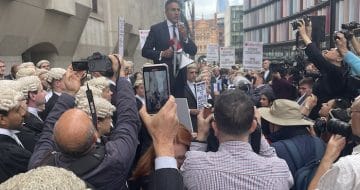Indefinite, uninterrupted strike starts today

Criminal barristers in England and Wales have today started an indefinite, uninterrupted strike over legal aid rates.
The walkout marks an escalation in tensions between criminal barristers and the government as they fail to agree on what is an acceptable level of pay for legal aid work.
The government decides what barristers get paid when defending those who qualify for legal aid. Following government cuts between 2010 and 2014, an Independent Review of Criminal Legal Aid published in December 2021 concluded that “funding for criminal legal aid should be increased overall for solicitors and barristers alike as soon as possible to an annual level, in steady state, of at least 15% above present levels”.
The government responded by accepting the independent review’s recommendation to throw an extra £135 million a year into the criminal legal aid sector and later in 2022 announced that it would increase the fees by 15% in September.
The Criminal Bar Association (CBA), however, wants a 25% pay rise from the government, arguing that with inflation at around 10% this “means that a 15% rise in fees will be more than extinguished by the time we receive it.”
The CBA says there has been an average decrease in criminal barristers’ real earnings of 28% since 2006 with average earnings from legal aid collapsing by 23% during the pandemic.
Industrial action was first taken back in April when criminal barristers stopped accepting returns (where a barrister will fill in for another barrister who cannot attend court and represent their client). At the time, the Justice Secretary Dominic Raab labelled this decision by the CBA “unnecessary and irresponsible”, linking barristers’ strike action to court delays.
Barristers then staged a series of escalating walkouts for four weeks from 27 June unless a deal was reached. These strikes were marred by allegations that Raab had requested the names of striking criminal barristers to be provided to the Ministry of Justice (MoJ) following reports by the Law Gazette that Crown court clerks had been asked to record daily data regarding non-attendance including those who did not attend court owing to strike action.
In response to the reports, the then chair of CBA, Jo Sidhu QC said: “Members were understandably concerned to hear reports that the Ministry of Justice had instructed court staff to name all barristers who do not attend court hearings because they are participating in the CBA’s days of action, involving criminal defence advocates. The CBA takes these reports extremely seriously. We have taken advice from solicitors and specialist counsel to consider whether this amounts to unlawful processing of personal data.”
Last week, the CBA said it had obtained internal court service emails stating that Lord Chancellor Dominic Raab made “a direct request” for striking criminal barristers’ names to be provided to the MoJ “with full knowledge of the downsides”. The MoJ has called these claims “categorically untrue” and it is understood that no names were directly shared with Raab.
With this build-up of distrust between both sides and no sign of agreement, criminal barristers, who had before this year only staged a day-and-a-half walkout back in 2014, are now at the beginning of an indefinite, uninterrupted strike.
For barristers, however, all this is not just about pay, but also about the current state of the criminal justice system and the future of the criminal bar. The anonymous best-selling author the Secret Barrister explains:
“It is not just about pay. It is about so, so much more. The criminal justice system has been devastated by years of cuts and chronic underfunding. Every part of the system has been slashed to the bone.”
Commenting on today’s strikes, Kirsty Brimelow QC, who on 1 September took up her role as chair of the CBA, said: “Barristers have stopped soldiering on through downtrodden courts.” She called for “proper investment in barristers who deliver the justice”, adding “this is not a ‘world-class justice system’, as set out as the vision of the Ministry of Justice. It is not even a functioning justice system.”
Justice Minister Sarah Dines has described today’s walkout as “an irresponsible decision that will only see more victims face further delays and distress”. The MoJ maintains that an increase beyond the proposed 15% will “cost a disproportionate amount of taxpayers’ money”.
Two key consequences of this fallout are increasing court backlogs in England and Wales, which at the end of June stood at 58,973 outstanding cases, and a brain-drain from the criminal bar in the wake of record pay rises in corporate law firms to the tune of around £180k as the highest NQ wages.
Criminal silk Chris Daw QC expressed his frustration on Twitter: “I don’t think the government realises that the barrister strike is not really a strike at all. For most junior criminal barristers it is the end of the line. They just can’t survive on legal aid rates. So they will just leave and do something else. They are very clever.”

